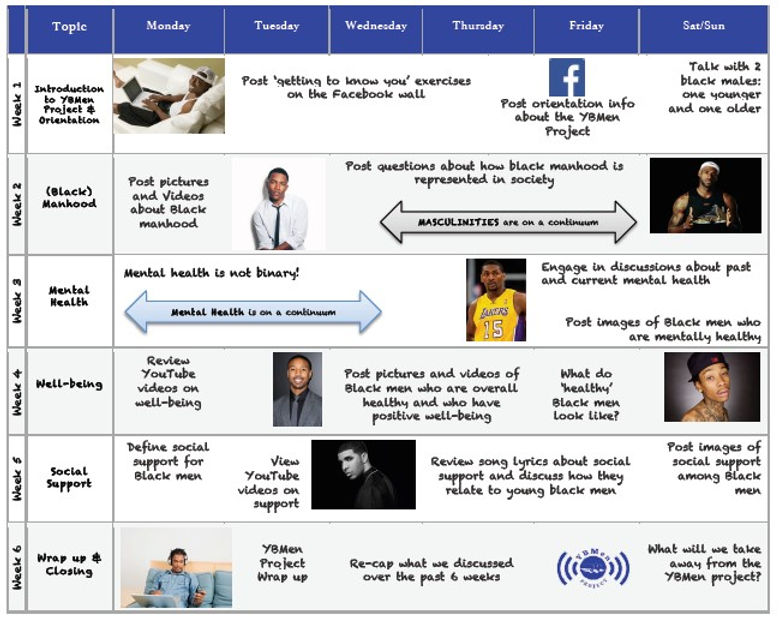

Academics
What is the study design?
The YBMen Project is a Facebook-based education and social support intervention for young black men that uses gender- and culturally-relevant prompts from popular culture and social media (e.g., song lyrics, images, YouTube videos) to educate black men about the importance of mental health and social support as well as the problems associated with rigid conformity to masculine norms.
A quasi-experimental, pretest-posttest design is used to develop and test the six- to eight-week, YBMen program with black men between the ages of 18 and 30. An intervention group and a comparison group participate in quantitative (survey) and qualitative (interview) data collection meetings at pretest (Time 1), posttest (Time 2), and one-month after the Facebook group has ended (Time 3). The qualitative procedures for the YBMen Project include administering brief, semi-structured interviews to participants at Time 1, Time 2, and Time 3.
Interview questions address the influence of masculinities on the mental health of young black men; young black men’s likelihood of participating in and benefiting from an online education and social support community; and ways in which mental health is influenced by cultural identity and conformity to masculine norms. The quantitative procedures include mental health, manhood, and social support measures.
What is the conceptual framework?
The conceptual framework for The YBMen Project was derived from a synergistic, three-pronged integration of evidence on the appropriateness of culture, gender, and the theory of online social support as a promising avenue for interventions to improve health among young black men.
First, because previous research by our investigative team and others has described the influence of social determinants on physical and mental health, we chose to focus our efforts on understanding young black men in the context of these social determinants (e.g., socioeconomic position, race, masculine identities, etc.).
Second, our research has also suggested that the behavioral interventions which target young black men need a culturally-appropriate and gender-specific approach that addresses their unique characteristics. The impetus for using these approaches has origins in community-based participatory research as well as research on interventions that are empowered by and for young black men.
Finally, we use the theory of online social support (OSS) to address gaps in previous models aimed at young black men that consider issues related to the social environment. The purpose of OSS theory is to describe health information-seeking behaviors that occur on the Internet through support characterized by interpersonal relationships with other unseen persons. During this process, information exchange and interactions between individuals are primary objectives.
How does it work?
Group-based techniques related to action planning and feedback, group problem-solving, and individual decision-making to improve health outcomes are expanded during each week’s topic. A sample 6-week intervention program is provided below.
